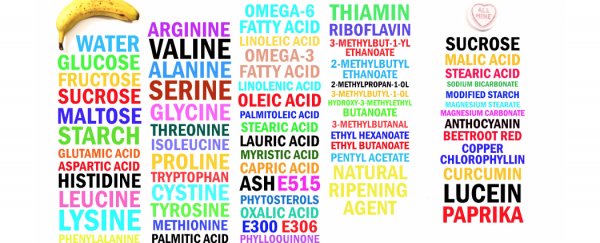If you're frustrated every time you see a food manufacturer market their product as "chemical free", and hear someone say, "If you can't pronounce an ingredient, don't eat it," don't worry, we're right there with you. But if you break out into nervous twitches at the sight of ingredients such as threonine, methionine, phenylalanine, icoleucine, and linolenic acid, the boys from AsapSCIENCE are here to help. Because what you're looking at aren't terrible chemical additives that go into the flavouring of Doritos, they're the ingredients of a simple, natural blueberry.
As the latest episode of AsapSCIENCE explains, every single thing we take in through our bodies is made up of chemicals, whether that's the water you drink or the air you breathe. In fact, if you put a list of all the chemicals that make up a banana next to a list of all the chemicals in a heart candy, you'll see that a banana consists of more than double the chemicals that go into that cheap sugary treat. But surely the man-made chemicals that make up a heart candy are way worse for us than the natural chemicals found in a banana, right?
Not necessarily, says AsapSCIENCE. Compare the chemical make-up of an apple to sodium thiopental - the chemical that goes into a lethal injection. Incredibly, the seeds of an apple have roughly the same toxicity level as sodium thiopental, in the form of the chemical amygdalin. Both the amygdalin in apple seeds and the sodium thiopental used in lethal injections become toxic at around 1,000 mg per kilogram of your body weight.
Fortunately for all those strange people out there who enjoy chowing down on apple cores, there's so little amygdalin contained in the seeds that to actually consume a toxic amount of amygdalin, you'd have to be eating apple seeds by the handful.
When it comes to our health, it's not about whether the chemicals in our food are made by nature or a scientist in a lab, it's the dosage of those chemicals that we expose ourselves to that matters. "We can't just give blanket statements to natural versus synthetic, because natural chemicals aren't always aren't always good for you, and man-made chemicals are not inherently dangerous," says AsapSCIENCE. Watch the video above to find out why you've never actually eaten a natural watermelon in your life. Sorry.
